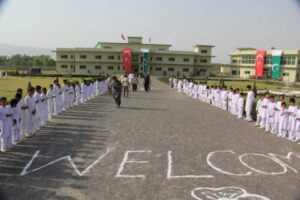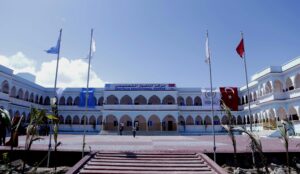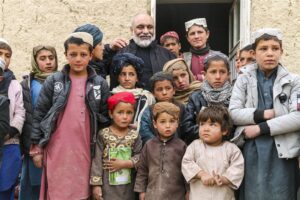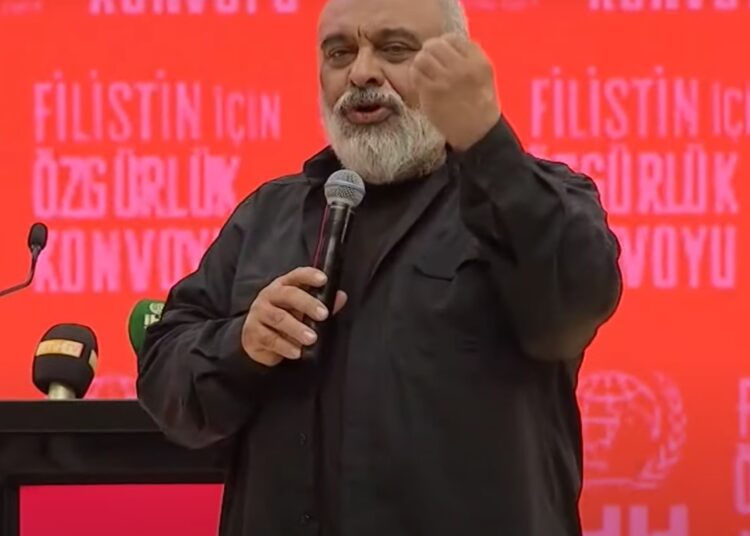Abdullah Bozkurt/Stockholm
A recent revelation showed that a Turkish jihadist charity organization’s global campaign to build orphanages is driven by the objective of raising armed jihadists worldwide, mirroring the tactics employed by Palestine’s Izz Al-Din Al-Qassam Brigades.
The previously undisclosed objective came to light through a public disclosure by the head of the Foundation for Human Rights and Freedoms and Humanitarian Relief (İnsan Hak ve Hürriyetleri ve İnsani Yardım Vakfı, or IHH), an organization that is aligned with the government of President Recep Tayyip Erdogan.
Speaking at an event in Ankara on November 3, Fehmi Bülent Yıldırım, president of the IHH, stated, “The winner of this war [Hamas-Israeli conflict] is Izz Al-Din Al-Qassam. I’m talking about kids whom they [Israeli forces] couldn’t defeat. Look, they [Qassam fighters] are all young. Did you know most of them are orphans? That’s why we stand with the orphans. Do you understand what I mean?”
In other words, the head of IHH acknowledged, perhaps inadvertently in a moment of excitement before the crowd, that the organization’s global efforts to build orphanages were aimed at raising fighters similar to Al-Qassam militants. These militants had launched surprise attacks on Israeli civilian and military targets on October 7, resulting in more than 1,000 casualties and over 200 kidnappings.
The IHH, with open support from the Erdogan government, has been active in 123 countries worldwide and boasts nearly 100,000 volunteers. Last year the organization allocated a significant portion of its 1.2 billion Turkish lira budget to countries such as Syria, Afghanistan, Somalia, Palestine, Pakistan, Yemen, Sudan, Niger and Bangladesh, where the funds were suspected to have been directed to radical groups.
IHH report on global orphanage network as of 2022:
“We are implementing special projects and building orphanages to protect orphaned children facing various dangers,” the IHH stated in its 2022 activities report obtained by Nordic Monitor. The report did not provide a detailed description of what these special projects entailed. However, Yıldırım’s explanation implied that orphans were being groomed to embrace jihadist ideology, with the anticipation that they would take up arms in the future, similar to the Qassam fighters.
The IHH’s internal report revealed that the organization completed 481 projects in 43 countries in 2022 specifically for orphans, benefiting 229,000 children. It continues to sponsor over 133,000 orphans. The organization allocated 229 million Turkish lira for orphanage projects during this period.
The charity allocated the largest amount of funds to support orphanage projects in Lebanon last year, followed by Sri Lanka, Iraq, Palestine, Somalia, Azerbaijan, Thailand, Sierra Leone, Afghanistan, Bosnia and Herzegovina, Kyrgyzstan, Tanzania, Mauritania, Tunisia, Iran, Kenya, Georgia, Myanmar, Mali, North Macedonia, Libya, Uganda, Kosovo, Indonesia, Montenegro, Burkina Faso, Zimbabwe, Ukraine, India, Serbia, Chad and Burundi.

The organization raises funds in Turkey with the benefit of a full tax exemption and has a license to run fundraising events without requiring prior permission from the government, thanks to a decree issued by the Erdogan cabinet. Additionally, it secures foreign funding, particularly from Qatar’s Sheikh Eid Bin Mohammad Al Thani Charitable Association, also known as the Eid Charity.
The IHH conceals special operations aimed at supporting militant jihadist activity under the guise of charitable work and the provision of humanitarian assistance.
According to a 2016 assessment presented during a court hearing by Ali Fuat Yılmazer, the former head of the police intelligence section specializing in radical religious groups, “The IHH campaigns are designed to provide assistance for jihadists engaged in terrorism around the world and supply medical aid, funding, logistics and human resources for jihadists.”
The IHH has long been identified by Russia as an organization involved in smuggling arms to jihadist groups in Syria, according to intelligence documents submitted to the UN Security Council on February 10, 2016. The Russian intelligence documents provided details, including the license plate numbers of trucks dispatched by the IHH, loaded with arms and supplies destined for al-Qaeda-affiliated groups, including the Nusra Front.

The controversial charity’s network faced accusations of smuggling arms to al-Qaeda-affiliated jihadists in Syria in January 2014. The investigation, conducted by a prosecutor in Turkey’s eastern province of Van, pointed to the IHH. Wiretaps and surveillance revealed that the Kayseri and Kilis branches of the IHH were involved in sending funds, medical supplies and household items to jihadists in Syria.
The shipments were revealed to be part of an operation conducted by a Turkish al-Qaeda cell led by İbrahim Şen, a high-ranking al-Qaeda operative. İbrahim Şen had been detained in Pakistan and imprisoned at Guantanamo until 2005 before being turned over to Turkey. His brother Abdurrahman Şen and other individuals were found to be sending arms, supplies and funds to al-Qaeda groups in Syria with the assistance of Turkey’s National Intelligence Organization (MIT), using the IHH as a logistics supplier.
Nordic Monitor previously reported, based on secret Turkish government documents, that the IHH has been collaborating with Turkish spy agency MIT in running jihadist networks from Syria to Turkey. The documents further disclosed the extent of this network’s connections to the Turkish government at the Cabinet level. They also exposed how the grassroots of the IHH were mobilized by the Erdogan government when the Turkish president needed political cover in the face of public pressure and criticism.

The secret investigation involved the examination of 142 wiretaps authorized by the courts between January 6, 2013 and December 17, 2013, as part of an inquiry into radical Islamist groups. The wiretaps identified a man named Veli Çayır, an intelligence officer who worked as the right-hand man of Hakan Fidan, the then-head of the Turkish spy agency and currently the foreign minister.
The head of the IHH had a special hotline to Çayır and would call him whenever he felt the need to share information on developments in Turkey and in places outside the country where the IHH had operations under the cover of charitable work. In wiretapped evidence dated February 25, 2013 Çayır made clear to Yıldırım that he was assigned to work with him under specific orders from Fidan and could be contacted day or night if needed.
The records indicate efforts to avoid divulging sensitive information on the phone, with a preference for using couriers to send confidential messages or arranging in-person meetings at secure locations. There are instances where Yıldırım appears to have visited MIT offices in Ankara’s Yenimahalle district. However, despite their precautions, the wiretaps captured substantial information during their phone conversations. This information was sufficient to establish a connection between the IHH and Turkey’s notorious intelligence agency.












